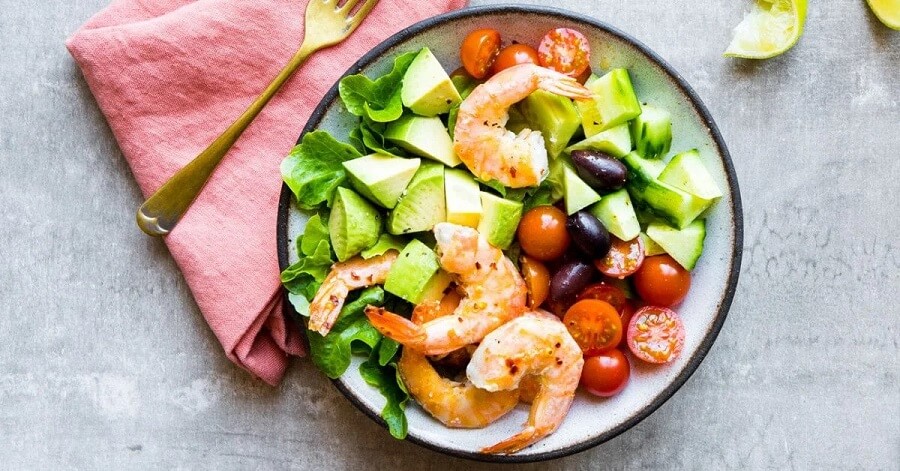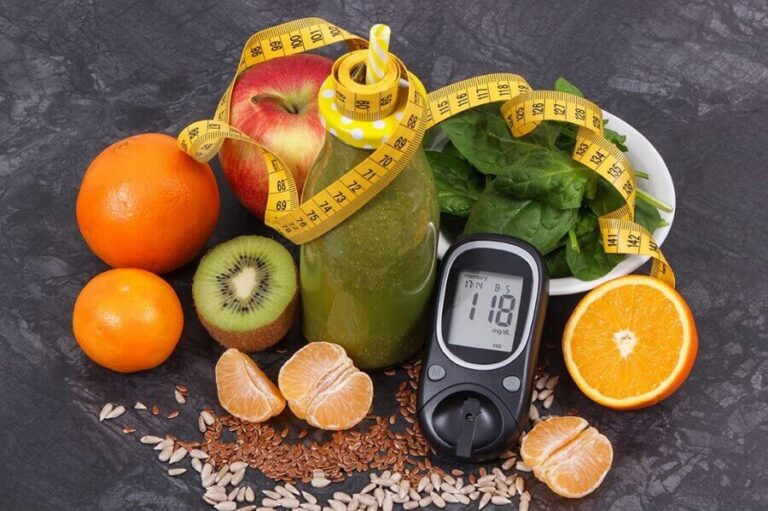Nutrition is the cornerstone of diabetes care. The basic rule of thumb for diabetes nutrition is to maintain stable blood sugar levels, emphasizing the quality and quantity of carbohydrate foods.
Avoiding refined carbohydrates and eating sources of fiber regularly every few hours will allow your body to digest and absorb energy from food without reaching spikes in blood insulin.
Also, because diabetes is a state of increased oxidative stress, antioxidant vitamins are essential. (1) Deficiency of these micronutrients can negatively affect the functioning of your muscles, heart, and a host of biochemical processes in your body.
Read on to learn more about the basics of diabetes nutrition with examples of the ten healthiest foods.
RELATED: Weekly Menu for Diabetics PDF
Nutrition for diabetes
Every person with diabetes should know that avoiding the consumption of added sugar and other products that cause spikes in high blood sugar levels is essential in their nutrition.
However, dietary planning for diabetes should be based on a comprehensive strategy and not just on eliminating “bad” foods. Ultimately, the shift towards healthy foods and various nutrients will help achieve a balance in your body.
A diabetic nutrition plan must first address a correct selection of carbohydrate foods, which must be distributed throughout the day. To carry out an adequate follow-up, it is recommended to combine foods so that values between 60 and 80 of glycemic load are obtained.
Also, make sure to include at least one protein source at every meal and healthy fats, if possible, high in Omega-3 fatty acids. To ensure the contribution of vegetable fiber, vitamins, and minerals, it is always advisable to include a source of healthy natural foods such as those discussed below.
RELATED:
- 5 Sweet Things You Can Eat With Diabetes
- Healthy Nutrition Type 2 Diabetes – WHO Recommendation
- The weekly menu for prediabetes
Top 10 healthy foods for diabetes
People with diabetes need to ensure that they always have natural foods with a low GI and high nutrient content in their diet. Here are the top 10 healthy foods for diabetes:
- Leafy vegetables
Due to their high potassium content, leafy vegetables (for example, spinach, lettuce, and all kinds of cabbages) help improve vascular function. In addition, they contain calcium, magnesium, and iron, minerals that have a positive effect on the blood parameters of diabetes.
- Berries
Berries are high in antioxidant flavonoids that are important in diabetic nutrition. Quercitin (a red or purple pigment) helps reduce the risk of chronic vascular disease by normalizing vascular permeability. Anthocyanin (a purple dye) can affect blood sugar levels.
- Green vegetables
On average, 100 g of green vegetables (peas, cucumbers, zucchini, etc.) represent no more than 3-6 g of carbohydrates, most of which are plant fiber. Eating them regularly helps the body better regulate blood sugar levels in diabetes.
- Nuts
For one thing, nuts are an excellent source of high-quality protein, fiber, and minerals. On the other hand, they are high in calories due to their high-fat content, so it is important not to overdo them. Include nuts as a snack and add these foods in small amounts to make them healthier.
- Citrus fruits
Since citrus fruits (orange, tangerine, grapefruit) have a low glycemic index, they can be included in healthy foods for diabetes. Its main additional advantage is the presence of a large amount of vitamin C, an essential component in immunity and skin health.
- Boniato
The sweet potato is a plant related to the common potato but differs from it by its healthy carbohydrate profile and lower glycemic index. In particular, the fiber content in sweet potatoes is 50% higher than in regular white potatoes, and, among other advantages, the increased presence of vitamin A can be noted.
- Tomatoes
Tomatoes owe their red color to the lycopene, a carotenoid pigment, a precursor to beta-carotene. The use of lycopene helps the body better fight the oxidative stress typical of diabetes, and a lack of this substance is associated with an increased risk of cardiovascular disease.
- Whole grains
Having diabetes doesn’t automatically mean that carbohydrates are banned, but it does impose a restriction on your glycemic index (and serving size). Whole grains with no added sugar (oatmeal, bulgur, barley, buckwheat) are the best choice as the primary source of healthy carbohydrates for people with diabetes.
- Salmon and blue sea fish
The fatty species of sea and ocean fish (salmon, salmon) contain omega-3 fatty acids. In the body, they act as antioxidants, helping to fight micro-inflammation. In addition, a significant proportion of the total amount of omega-3s in the body is found in the brain, which according to new studies, has been linked to fighting migraines. (3)
- Unsweetened yogurt
Plain yogurt (meaning yogurt with no added sugar) is an example of fermented food containing probiotics. The consumption of yogurt positively affects the state of the intestinal microflora, helping the body better absorb all kinds of food nutrients. Also, it is high in protein and calcium. We included yogurt in the list of 10 healthy foods for diabetes.
Can you eat meat with diabetes?
The presence of diabetes does not impose an immediate ban on eating meat. However, if you have diabetes and eat meat frequently, it is essential to keep track of the total amount of saturated fat in your diet. With a daily intake of 2000 kcal, the upper limit (according to WHO recommendations) is 7% of calories in saturated fat: 20-25 g per day. (1)
At the same time, the World Health Organization reminds us that the consumption of sausages, cold cuts, and other ultra-processed meat products should be limited even in the diet of healthy people; this includes people with diabetes. These foods can negatively affect the level of inflammation in the body and are considered carcinogenic.
Is the low-carb diet healthy for people with diabetes?
Your dietary strategy for diabetes largely depends on how your body responds to glucose and whether there are other chronic conditions. Being overweight (and, in particular, metabolic syndrome) may require a reduction in caloric intake and, in many cases, a low-carbohydrate diet.
When it comes to type 2 diabetes, eating a low-carb diet can help and even reverse the disease. Studies have found that the parameters can improve even more than some medications such as metformin. (4) If you want to see more details, you can check: in a year, the low carbohydrate diet can reverse type 2 diabetes.
However, it is also true that vitamin and mineral deficiencies are more frequent when following a low-carb diet. Therefore, if you have diabetes and adhere to this type of nutrition, be sure to do it accompanied by a professional. Your doctor will likely tell you to include more foods or supplements fortified with these nutrients.
RELATED:
ABSTRACT
Good nutritional management of diabetes can positively affect health and quality of life in the long and short term. A proper nutrition plan in the presence of type 2 diabetes should be based on the control of blood sugar levels and the inclusion of natural sources of vitamins and minerals in the diet. These play an essential role in metabolic processes.







